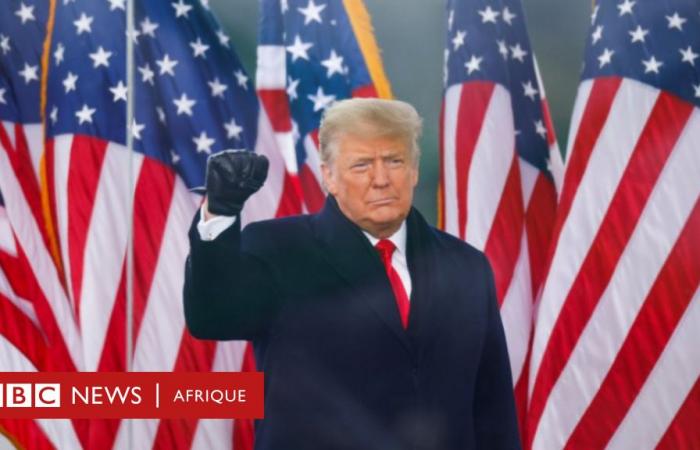- Author, Writing
- Role, BBC News World
-
11 minutes ago
The U.S. Supreme Court ruled Monday that former President Donald Trump has partial immunity from prosecution for actions he took while in office.
The court granted him the right to “absolute immunity from criminal prosecution” for official acts he performed while in office.
However, it ruled that Mr Trump did not enjoy immunity for unofficial acts.
The Supreme Court justices, with a conservative majority, delivered their verdict by a vote of six for and three against.
A “victory” for Trump
“We conclude that, under our constitutional separation of powers structure, the nature of presidential power requires that a former president enjoy some immunity from criminal prosecution for official acts performed while in office,” Supreme Court Chief Justice John Roberts wrote in the document explaining the verdict.
He added that, “at least with respect to the exercise by the president of his fundamental constitutional powers, this immunity must be absolute.”
He clarified, however, that “the president does not enjoy immunity for his unofficial acts, and not everything he does is official. The president is not above the law.”
Mr Trump hailed the decision as a “great victory for our Constitution and our democracy” in a message posted on his social networking site Truth Social.
Most analysts view the decision as a victory for the Republican.
But his lawyers are already using it as an argument to overturn the conviction the former president already received in a criminal case for falsifying documents to conceal a payment in exchange for his silence to former porn star Stormy Daniels, according to US media.
Mr Trump’s lawyers reportedly sent a letter to the New York judge presiding over the trial and cited Monday’s Supreme Court ruling as an argument.
In this case, the conviction is for 34 counts of falsifying commercial documents and is expected to be sentenced on July 11.
The signing of these documents took place during his tenure in the White House in 2017, which his lawyers say should be taken into account.
Donald Trump’s lawyers insist that the latest Supreme Court ruling upholds the defense’s position in the New York case that some evidence in the indictment should not have been allowed because it constituted official presidential acts.
Photo credit, Getty Images
“A dangerous precedent”
For its part, Joe Biden’s electoral campaign expressed that the Supreme Court’s decision “does not change the facts” of what happened on January 6, 2021 and affirmed that Trump “thinks he is above the law and that he is willing to do anything to win and keep power.”
This is also the opinion of one of the three justices who voted against, Sonia Sotomayor, who quipped that because of this decision, “the president is now a monarch” who is “above the law.”
On Monday afternoon, President Biden said in a televised address that the court’s decision set a “dangerous precedent.”
“This nation was founded on the principle that there are no kings in America. Every one of us is equal before the law. No one, no one is above the law. Not even the President of the United States.”
“Today’s decision by the Court almost certainly means that there are virtually no limits to what a president can do,” Biden said.
“The man who sent this mob into the United States Capitol faces criminal charges for what happened that day. The American people deserve to have their answer in court before the next election,” he added.
Mr Biden was referring to Mr Trump being tried for his alleged role in sparking the riots.
“Now, because of the court’s decision today, that is very, very unlikely,” Mr. Biden said.
The 3 cases against the former president
Donald Trump, who has always maintained his innocence, faces three criminal cases.
The first relates to his allegations of alleged fraud in the November 2020 election he lost to Joe Biden and the storming of the Capitol by his supporters on January 6, 2021.
Federal prosecutors say Trump pressured officials to overturn the election results, deliberately spread lies about alleged voter fraud and tried to exploit the Capitol riots on January 6, 2021, to delay the certification of Joe Biden’s victory and stay in power.
As a result, he was indicted on four counts, including conspiracy to undermine the United States and conspiracy against the rights of citizens.
Photo credit, Getty Images
Another separate case also concerns the 2020 election, in this case in the state of Georgia, where he lost by a narrow margin.
The former president and 18 others are accused of criminally conspiring to overturn that defeat by illegal means.
The investigation is based in part on a leaked phone call in which Mr. Trump asked the state’s top election official to “find him 11,780 votes.”
The third case involves classified White House documents that the former president allegedly took to his Mar-a-Lago residence after leaving office.
There are also questions about whether he obstructed FBI efforts to recover the files, as well as the criminal investigation into how he handled them.
Most of the charges in the case involve intentionally withholding information relating to national defense, which is a criminal offense under the Espionage Act.
“Official” and “unofficial” representations
The document in which the Supreme Court justices explained their decision contains some clues about which of Mr. Trump’s actions are considered official, and therefore protected by immunity, and which are not.
For example, ordering the Justice Department to discuss with states the investigation of alleged election fraud would constitute an official act.
Similarly, speaking to then-Vice President Mike Pence, whom Trump pressured not to certify the results of the 2020 election, would constitute an official act.
They also considered Mr Trump’s speech on the morning of January 6, 2021 – in which he encouraged protesters to march on the Capitol and suggested he might join them – and tweets he sent that day.
Photo credit, Getty Images
Supreme Court justices leave it to lower courts to determine whether certain acts are considered “unofficial.”
One is trying to convince state officials that alleged voter fraud meant they had to change the state’s votes in favor of Mr. Trump.
Another is creating lists of “fake electors” for states to send to Congress to certify that Trump won the election in places where he actually lost.
Both charges are related to the charges against the former president in Georgia.
Donald Trump’s campaign for the 2024 election has been marred by several legal scandals.
In late May, at a trial in New York, he was found guilty of 34 counts of falsifying documents to conceal a secret payment to former porn star Stormy Daniels.
The decision made Mr Trump the first former US president in history to be convicted in a criminal trial.
Trump doesn’t get full immunity, but he wins a victory
Analysis by Anthony Zurcher, BBC North America correspondent
The decision made on Monday satisfied the former president and his team.
According to the court, Donald Trump enjoys full immunity for official acts he performed as president that are related to his basic constitutional functions.
Furthermore, there is a presumption of immunity for any other official act.
In practical terms, this means prosecutors will have to work much harder to make their case about election interference and the January 6 assault on the Capitol.
Supreme Court Chief Justice John Roberts has laid out guidelines that could be particularly damaging to the prosecution’s case against Mr. Trump.
The former president’s attempts to pressure Vice President Mike Pence not to certify Joe Biden’s election victory — a key part of special counsel Jack Smith’s case — are a type of official action subject to a higher standard of legal scrutiny.
His communications with Justice Department officials enjoy absolute immunity.
The president’s comments on January 6, which allegedly incited the attack on the Capitol, would also be considered official acts.
The court added, however, that Mr Trump does not enjoy immunity for unofficial acts, meaning he could still face some charges.
But the court’s decision ensures that the case will be delayed well beyond the November presidential election while a lower court works out the details of that decision.
The court may not have granted Mr. Trump the blanket immunity he sought, but in practice it was a major victory for the former president.






